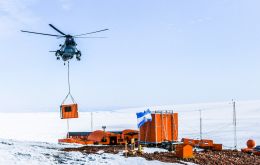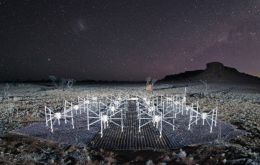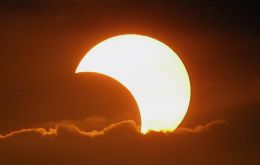MercoPress. South Atlantic News Agency
Tag: astronomy
-
Monday, December 27th 2021 - 20:45 UTC
Argentina to set up Antarctica observatory to look for exoplanets

Argentina will install an observatory at the Belgrano II base in Antarctica, 1,300 kilometers from the South Pole, which will be operated from Buenos Aires. The automated telescope will be used to detect exoplanets and other celestial bodies which are difficult to watch from other latitudes, it was announced.
-
Friday, January 15th 2021 - 09:17 UTC
In 2021 the Earth is forecasted to spin faster making astronomical days shorter

In 2020, the Earth broke the previous record for shortest astronomical day, set in 2005. In effect the Earth broke the record 28 times in 2020, and it's still spinning faster. While Earth is, on average, pretty reliable and takes 86,400 seconds to rotate around its axis, this is not perfect.
-
Wednesday, October 21st 2020 - 09:22 UTC
NASA feat: spacecraft grabs a sample of rocks from an asteroid and begins to send back images

NASA spacecraft touched down on the rugged surface of the Bennu asteroid on Tuesday, grabbing a sample of rocks dating back to the birth of our solar system to bring home. The minivan-sized OSIRIS-REx spacecraft, built by Lockheed Martin, extended its 3.35m robotic arm toward a flat patch of gravel near Bennu’s north pole and plucked the sample of rocks, the space agency's first handful of pristine asteroid rocks.
-
Thursday, September 10th 2020 - 09:16 UTC
Massive star scanning confirms that so far, there are no extraterrestrial civilizations

Scientists have completed the broadest search to date for extraterrestrial civilizations by scanning roughly 10.3 million stars using a radio telescope in Australia, but have found nothing – not yet, at least.
-
Thursday, October 10th 2019 - 09:43 UTC
Nobel Physics Prize for a Canadian cosmologist and two Swiss astronomers

Canadian-American cosmologist James Peebles and Swiss astronomers Michel Mayor and Didier Queloz won the Nobel Physics Prize for research increasing our understanding of our place in the universe, the jury said.
-
Thursday, September 12th 2019 - 19:28 UTC
Scientists reveal discovery of exoplanet with Earth-like temperatures and water

Water has been discovered for the first time in the atmosphere of an exoplanet with Earth-like temperatures that could support life as we know it, scientists revealed on Wednesday. Eight times the mass of Earth and twice as big, K2-18b orbits in its star's “habitable zone” at a distance - neither too far nor too close - where water can exist in liquid form, they reported in the journal Nature Astronomy.
-
Tuesday, July 2nd 2019 - 11:50 UTC
Solar eclipse Tuesday afternoon stretching from La Serena, Chile to Buenos Aires

Day will turn into night on Tuesday afternoon as the sun, moon and Earth align perfectly during the first total solar eclipse since 2017. The eclipse will only be visible across the southern Pacific Ocean and South America, but can be seen anywhere from around the world online through NASA TV.
-
Friday, May 31st 2019 - 09:52 UTC
The centennial anniversary of the Sobral Eclipse, a feat of Brazilian and British astronomers

May 29th marked the one hundred year anniversary of the Sobral Eclipse. Six minutes of darkness a century ago put Brazil and the UK at the heart of what was possibly one of the most important scientific discoveries of the 20th century.
-
Tuesday, October 2nd 2018 - 09:12 UTC
NASA scientists solve mysteries of the Earth's rotation wobbling

Using satellite data on how water moves around Earth, NASA scientists have solved two mysteries about wobbles in the planet's rotation - one new and one more than a century old. The research may help improve our knowledge of past and future climate.
-
Wednesday, February 14th 2018 - 10:04 UTC
Falklands under the cone of a partial solar eclipse on Thursday

Everyone admired the rare phenomenon of the supermoon recently. Pictures of the lunar eclipse flooded the social media platforms. But for astronomy enthusiasts, there is another celestial event happening this week. On the 15th of February, a partial solar eclipse is going to take place. However, the celestial event will be seen over parts of Antarctica, southern parts of the Atlantic ocean and South America's Patagonia, including the Falkland Islands.
